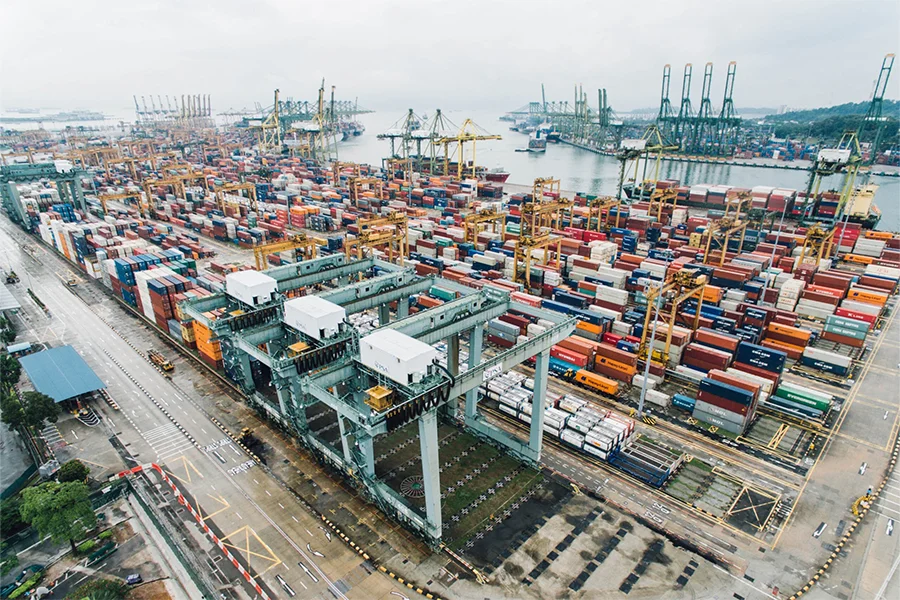International shipping terms

“In the international sector, there are many practical terms that are used in the process of moving products. The most important international transportation terms include:
- Bill of Lading: A bill of lading is a security document issued by transportation companies, which includes the full details of the goods, such as the sender, recipient, shipping cost, commission, and information about the shipped goods.
- Logistics: The word logistics has a Greek root and in practice means the process of procurement, planning, execution, control, and supervision of the quality of transportation and care of shipments from origin to destination. The main goal of logistics is to meet the needs and services required by customers and consumers.
- Loading: Loading goods means placing the shipment in a vehicle for transportation.
- Insurance Policy: An insurance policy is a document issued by the insurance company at the request of the policyholder to insure the shipped goods during the transportation process, and in case of any damage, the loss is paid by the insurance company.
- The International Transport of Goods: International transportation means moving products from one country to another, which is done with special arrangements and specific laws related to international logistics.
- CMR (Convention on the Contract for the International Carriage of Goods by Road): CMR is one of the terms of land transportation, which is a non-transferable document, and by issuing it, the carrier undertakes to deliver a shipment from origin to the final destination by land vehicle such as a truck in exchange for receiving a fare.
- Airway Bill: An airway bill is also one of the terms of air transportation, which is issued in 12 copies. 3 copies of the airway bill are original, and the rest of the copies are used for different parts of the airline company. An airway bill is a type of receipt that does not mean a negotiable document of goods, but a sheet that the owner of the goods can receive their goods by presenting it to the relevant airline company.
- Forwarder: A forwarder is a legal entity (company) that is responsible for the transportation of shipments and concludes a goods transportation contract with the customer. In other words, companies that have a direct contract with the customer are called forwarders.
- Carrier: A carrier is also a transportation term that means the transporter. A carrier is a legal entity (company) that, by signing a contract with a forwarder company, takes full responsibility for the transportation of products and delivers the goods to the final destination using its equipment and vehicles.
- Cottage (Kootaj): The operation of registering a declaration in customs offices is called Kootaj.
- Supplier: A supplier of goods and services is a person or company that a customer or consumer repeatedly buys from and only supplies their required goods from there.
- HS Code (Harmonized System Code): An HS code is an 8-digit number that is given to each item and contains information and a brief description of it so that destination companies can easily control the imported goods.
- Shipped on Board: The term shipped on board is one of the terms of sea transportation, which, by being included on the bill of lading along with the name and voyage number of the ship, issues a shipping permit.
- THC (Terminal Handling Charges): THC is another transportation term that means terminal charges for loading at origin and unloading at the final destination, and usually the origin is the responsibility of the seller and the destination is the responsibility of the buyer.
- Entry or Exit Statement: A declaration that must be submitted to the customs authorities by the person in charge of the means of transport of goods when the means of transport enters or leaves, and includes information such as the specifications of the means of transport, travel route, type of cargo, baggage items, and requirements of employees and passengers.
- Transit Commitment: Transit commitment is also one of the transportation terms and means a document that is prepared by the customs and allows goods to be transported under customs transit without prepayment of import duties and taxes.
- Drawback: Drawback also means refund and return of customs duties, especially to someone who re-exports imported goods.
- Cabotage: Cabotage is also one of the terms of sea transportation, which means the transportation of goods from one port of a country to another port or from one customs to another customs.
- Abandoned Goods: Abandoned goods are goods that their owner, for any reason, does not take action to deliver and clear them, or delays in providing the necessary documents for their delivery, in which case the goods are considered abandoned goods after a while.
- Stuffing: Stuffing means unloading cargo from a truck and loading or transferring it to a container, which is usually done by a forklift.
- Customs Territory: Customs territory is an area in which the customs law of a country is fully implemented. Usually, the customs territory of a country is the political territory of the country, which includes its land, sea, and airspace. However, some parts of the political territory may not be part of the customs territory, such as free ports.
- Customs Transit: Customs transit is a customs procedure according to which goods are transported under customs supervision from one customs house to another customs house. Usually, customs authorities allow the transport of goods under the title of customs transit in their customs territory in the following order: a) from an entry border customs house to an exit border customs house (foreign transit), b) from an entry border customs house to an exit border customs house (domestic transit), c) from an internal customs house to a foreign border customs house (foreign transit), d) from an internal customs house to another internal customs house (domestic transit).
- Custom Declaration: Any statement or action regarding specific information required by customs in any form recommended or accepted by customs. This term also includes declarations prepared by automatic information processing machines and communication methods. This term also includes any action taken in the passenger section under the two-channel method (red-green).
- Customs Violation: Committing any act that causes or intends to deceive the customs and refraining or intending to avoid paying all or part of the import and export duties and taxes or ownership or use of what is prohibited or restricted by legal and regulatory regulations and the customs is responsible for its implementation or any act that is done with the intention of obtaining any privilege contrary to regulations is considered a customs violation.
- Custom Duties: Duties that are imposed according to the customs tariff and are due when entering and leaving the customs territory.
- Customs Formalities: All operations that must be carried out by the interested person and the customs in order for customs regulations and its regulations to be implemented in the case of supervision of passengers and declaration of baggage and furniture and vehicles in entering and leaving and passing through the customs territory. These formalities may include formalities related to plant health, veterinary, immigration, currency and license issuance regulations. Customs formalities are defined according to different customs procedures according to the customs annexes of the Kyoto Convention.
- Drawback Procedure: A customs procedure that allows all or part of the import duties and taxes that have been received from the exported goods or the materials in that goods that have been used in its production to be refunded when the goods are exported.
- Customs Clearing Agent: A person who is engaged in customs affairs and declaration of goods to customs and directly performs customs affairs on behalf of another person.
- Free Zone: A part of a political territory where the goods offered there are not subject to the usual customs controls in terms of import duties and taxes.”
